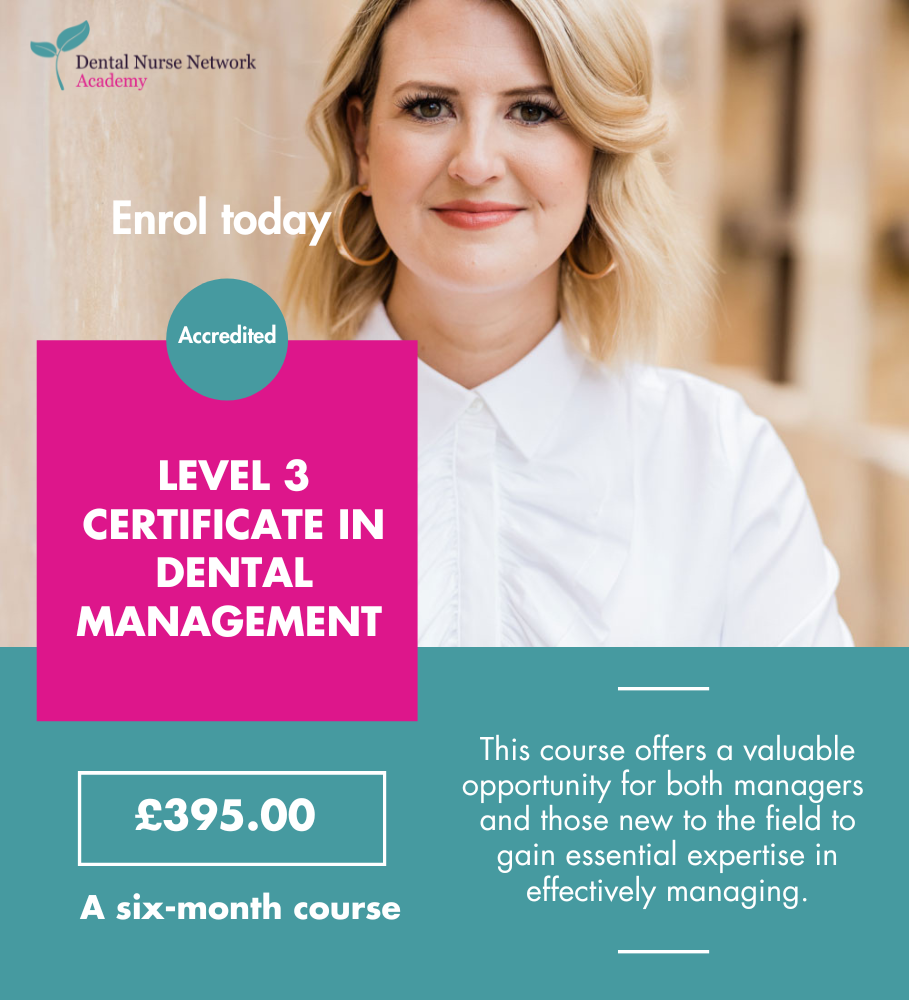 Rachel Hughes is a dental nurse with nearly 18 years of experience in the industry. She, like many other nurses, has a passion for training and development of other dental professionals. She successfully balances working as an extended duties dental nurse with being a dental trainer and a tutor for NEBDN National diploma.
Rachel Hughes is a dental nurse with nearly 18 years of experience in the industry. She, like many other nurses, has a passion for training and development of other dental professionals. She successfully balances working as an extended duties dental nurse with being a dental trainer and a tutor for NEBDN National diploma.
For as long as I can remember, during my many years as a dental nurse, I wanted to be a dental nurse tutor. I always seemed to be the one nurse with whom the trainees were put to observe them at work.
I was the one who taught the mixing, and explained the theory behind the practice. Everyone told me that I seemed to just have a natural ability to explain things well and made it so that it was actually relevant to them.
The first step was to become a qualified dental nurse, which sounds like common sense in the world of dentistry today, but I wasn't always qualified. Back in 1996, when I was a trainee, qualification wasn't compulsory but I am so glad that I dismissed the handful of negative comments about "there being no point" in being a qualified and registered dental nurse. It gives you so much more scope for further career development, because, YES, dental nursing is not just a job! It's a career, a vocation and we belong to a professional body which makes us professionals in our own right.
The route to becoming a qualified dental nurse has changed somewhat over the last few years. Previously, the NEBDN National diploma was the only qualification available to trainee nurses, but now the General Dental Council (GDC) recognises the following:
- NEBDN National Diploma for Dental Nurses
- City & Guild NVQ Level 3 Dental Nursing - England & Wales
- Scottish Vocational Qualification (SVQ) Level 3
- Certificate of Higher Education in Dental Nursing (CertHE) Cardiff, Teesside and Portsmouth Universities
- Foundation Degree in Dental Nursing - Northampton
If you feel that being a dental nurse tutor is for you, I would advise you to gain relevant experience following your initial qualification in order to develop as a dental nurse. Oral Health education gives you good grounding for progression into wider dental education. This doesn’t just for further and underpin your knowledge in dentistry and dental diseases, but it also covers how to structure and deliver an educational session on a one-to-one basis or to a much larger group.
Of course, there are many other qualifications a registered dental nurse can obtain. Further certificates that could be useful include:
- Radiography
- Special care nursing
- Orthodontic nursing
- Sedation
- Decontamination lead
Other areas to consider undertaking competency training in include extended skills such as impression taking, clinical photography, topical fluoride application, and shade taking or as a whitening assistant. Of course, you should not forget specialities such as Implantology. All or any of these courses and qualifications will add value to your knowledge and expertise.
Gaining experience
Become a treatment coordinator - discussing treatments plans and consent for treatments on a regular basis really reinforces your knowledge, helps you to develop your communication skills and creates a more confident you.
Mentoring - being a mentor to less experienced nurses you can help deliver underpinning knowledge while you gain experience, especially if you go all out and really look at how to structure a training programme.
In house training sessions - having regular training sessions with the whole dental team at a frequency to suit your business is beneficial to all. Challenge yourself to develop verifiable training sessions. This will help you get to grips with aims and outcomes as every learning session should have clearly defined aims and outcomes.
Volunteer at local training centres - Find out where dental nurse training is carried out in your local area and talk to the tutors. Volunteering your time, knowledge and experience as a classroom assistant benefits the tutors and dental nurses of the future. As for you, you get that all important foot in the door and the opportunity to see different learning and teaching styles, assessment methods and really what commitment is needed when you enter the world of education.
Still want to be a tutor? Then here's what to do next
Talk to your local colleges about enrolling on the following course/s
Preparing to teach in the Lifelong Learning Sector (City & Guild 7303) level 3/4 (PTLLS)
This is for those starting out as trainers or teachers and involves:
• Identifying learning needs
• Planning for learning
• Engaging learners with different characteristics
• Assessing learning
Certificate to teach in the Lifelong Learning Sector (City & Guild 7304) level 3/4 (CTLLS)
This level is more appropriate for experienced teachers and involves:
• Managing learning and development in groups
• Principles of assessment in lifelong learning
• Planning to meet the needs of learners
• Developing, using and organising resources
Diploma to Teach in the Lifelong Learning Sector (City & Guild) Level 5 (DTLLS)
This qualification will prepare you for a career as a teacher in the further education sector.
Certificate in Further Education (City & Guild 7407)
The City and Guilds 7407 is a nationally recognised vocational qualification in teaching and training for teachers of adults. Completion of the course can provide entry to the Certificate or Post Graduate Certificate in Education and to other forms of study in Higher Education. The purpose of the course is to provide initial training for all teachers and trainers in post-compulsory education and training. In addition to 4 hours of class based study, most teachers will spend 4 to 6 hours of study outside of the class situation.
These Certificates in Further Education (FE) Teaching demonstrate your capabilities in all aspects of the FE teacher's role - from teaching to supporting learners to managing resources and measuring learners' achievements in a further education setting.
Who are they for?
If you are starting out in further education (FE) teaching, the Level 4 Certificate helps you prove your skills in teaching, planning and management. The Level 5 certificate is for teachers with more experience in the FE environment who wish to move into senior roles, including lecturing and training.
NVQ Assessor
Being a dental nurse tutor usually involves being an NVQ assessor also and, is dependent on your training provider elements from the assessor qualification map over the PTLLS qualification.
The NVQ QCF assessor qualification was formerly known as the A1 Assessor Award or, before that, the D32/33. By obtaining this you will be qualified to assess people both in work, and non-work (ie training), environments.
CLICK HERE FOR STEP BY STEP GUIDE ON HOW TO FIND A COLLEGE NEAR YOU
References
http://www.staffs.ac.uk/services/careers/typesofwork/education/fe_education_courses_stoke_college.pdf
http://www.cityandguilds.com/Courses-and-Qualifications/learning/teaching
http://www.gdc-uk.org

